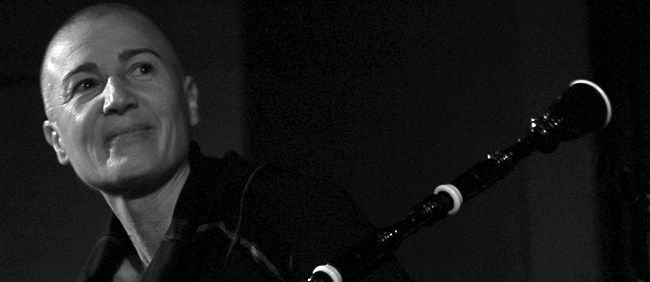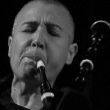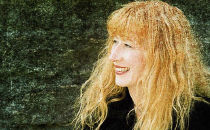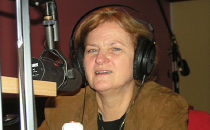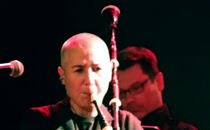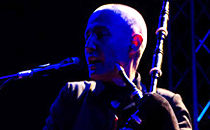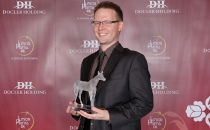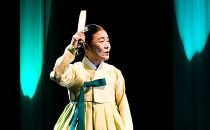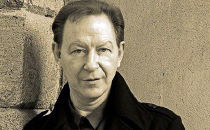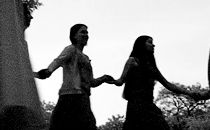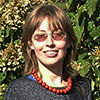At the beginning I would like to ask you about your first contact with traditional music? Was it the turning point of your life? And what happened after it?
The first contact was at my grandparents. They were living in a house made of stone, speaking gallego and had a perfect understanding of the environment they belonged. This was a direct relation between tradition and living harmony, making a difference between tradition and traditionalism (way of thinking in which the aesthetics of the traditions or concrete forms of action are kept). At thirteen, something very shocking happened to me. From the A Costa Da Morte camping came out two women of 40 years old from a bar, from a small village Baldaio, they were telling me that I badly played the pandereta there, which should be played in another way. They started playing ternary telluric incredibly strong voices in unison, so powerful. From that moment I could not be indifferent to something so strong and something to which there was no access in the cities, or had knowledge of its existence.
Last year I saw your performance during the Warsaw Cross Culture Festival in which you performed alone. I also saw on youtube your concert with a bigger band at the ”Directos da Galega”. What do you prefer – to perform alone or with a larger band?
The concert that you are reffering to was 11 years ago…, how time passes! I am a very shy person. I am on the stage because life brought me to it. That is why I don’t think of what I preffer, I just think of the music and the stage just as an artistic act, as an act where I can contribute something to this society, in a modest way but with a complete sincerity. I conceive the stage as a sculptural part, special. For example, my latest album, SÓS, is as well with a band, but every concert transforms it in a different action. The performance in Warsaw on the 10th 2012 at Etno-Ugór festival is another thing… solo, etno, electroacoustic, closed work, feminist action.
What are the reactions to your interpretation of traditional music in Galicia, beyond Galicia and abroad?
Traditional music is what has created a people or community over time, without leadership, perfect because hundreds of years, thousands of people have contributed and left on the way what was not worth. My music is personal, a person with much knowledge of the music of his homeland but created in solitude. So I am seen in Galicia, or so I think, I feel very loved. Luckily is that since I started this compositional journey international criticism has placed me as someone to be reckoned with. I have traveled more than 350 international festivals and I feel very well treated. I also think that my speech is totally contemporary and global. My postition is political, “here and now”.
How did you happen to meet members of Warsaw Village Band?
Through Mateusz Dobrowolski. He offered me a little tour with my electronic show… alone on the stage with all my instruments and with the collaboration of Warsaw Village Band. I was sent their music and I immediately said yes. It is beautiful. We have had some rehearsals and I think that the the disc they want to edit with the international collaboration will have an excellent result.
Have you ever heard any recordings of Polish traditional/folk/etno groups?
I had the luck that Magda from Warsaw Village Band sent me bagpipes music played by a traditional musician from the village … beautiful.
You played a few concerts in Poland some time ago. What are your impressions after visiting our country?
A cultural, modern nad friendly country with passionate public for the music.
Do you have any special, favourite place or places in Europe where you like performing best?
I like Poland, France (festival of Arlés), Hugary (Sziget), Germany, Holland, Belgium (rez of flamenco theaters), Barcelona-Cataluña, Pais Vasco, Slovenia, Switzerland etc. Every place is unique and wonderful.
You have been finding a lot of inspirations for your compositions in Galicia’s villages from local, traditional musicians. Have they shared their music without problems? How have they reacted to the strict traditional music mixed with elements of rock and electronic drive?
This is a very complex question. I will try to answer it. The local musicians, the ones who transmitted all of those songs do not have musical studies, they are not aware of their wisdom and they are not traditionalists (they do not belong to a movement that pretend to perpetuate aesthetics forms). They love me and they are happy for my successes, they recognize themselves in forms that I use, but not as a whole. Their music is made and transmitted from one generation to another for a community's collective trance, like all of the traditions in the world who are still alive and they are being transmitted both orally and visually. If we have to play together it is I who have to adapt, and I am doing it with all the respect and admiration, because it is wonderful to be in a trance for hours, dancing and playing monotonous rhythms to reach that community catharsis. I wish my music could compete with that.
How would you describe your music?
This is another difficult question for me to answer. Personal music, sculptural, a bit cinematographic, full of humor. Feminist, energetic, ethnic, electronic… social.
Where did your last important performances take place?
Festival de Cálgary, Arlés, Cidade da Cultura Galicia, Le Puy an -Velay, Dranouter etc.
Last question: are you happy that the WOMEX 2014 will take place in Galicia, in Santiago de Compostela?
Yes, I am. It is an opportunity for the local groups to participate in a global show without travelling and an opportunity to see groups from all over the world on our land.
Translation from Spanish to English: Luciana Ciobanu - thank you very much !
